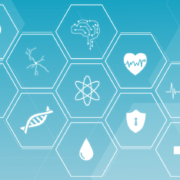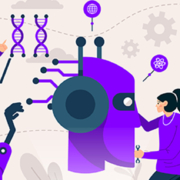A Major Hurdle to Large-Scale Implementation of Quantum Computing Has Been Overcome!
The promises of quantum computing, particularly when combined with AI, are many. However, the technology, while being used in some real-world applications, is still in its infancy, and there are many hurdles yet to be overcome before quantum computers can be implemented on a large scale. However, researchers with Sussex University report that they may have just overcome one of them.
The scientists say that they have managed to transfer data between chips at record speeds and – more importantly – record accuracy.
“What we have achieved here is the ability to realize extremely powerful quantum computers capable of solving some of the most important problems for industries and society,” said lead researcher Prof Winfried Hensinger.
The foundation of the power of quantum computing is drawn from quantum physics, hence its name. Without getting into a complex discussion beyond the scope of this article, quantum computing relies on one of the driving principles of quantum mechanics, namely that subatomic particles can literally exist in two places at the same time and can be in a state of “quantum attachment” mirroring each other’s actions almost simultaneously across unfathomable distances.
Leveraging these properties in the computational space means that quantum computers could potentially handle multiple processes at speeds not possible with even today’s most advance “supercomputers.”
One of the major obstacles to the technology’s development has been the ability to transfer information across chips, so it remains intact. Quantum computers, by design, are highly sensitive and therefore have a low fault tolerance. That means that the slightest interferences can disrupt their effective operation.
The research team at Sussex University demonstrated a way to transfer information between quantum chips with 99.999993% reliability, and the connection rate was 2424/s.
Both set world records, the researchers say, and show it’s possible for quantum chips to be fitted together to build more powerful quantum computers.
Director of the National Quantum Computing Centre, Prof Michael Cuthbert, commented on the findings.
“To build the type of quantum computer you need in the future, you start off by connecting chips that are the size of your thumbnail until you get something the size of a dinner plate. The Sussex group has shown you can have the stability and speed for that step.”
How is This Discovery Relevant to AI?
It is quantum computers that will create astronomical changes in the field of AI. Currently, it can take months to train an AI model to become effective. Quantum computing will speed up AI and machine learning by considerable orders of magnitude.
In fact, IBM has already revealed mathematical proof that quantum machine learning is exponentially faster than standard methods of ML, as long as “one can provide classical data to the algorithm in the form of quantum states.” Although it remains theoretical at this point, if it can be applied, then the future for AI and quantum computing looks very promising indeed.
Furthermore, and perhaps even more significant to the Sussex discoveries, is that the ultimate goal of AI is to recreate, as close as possible, the human mind. Prof Hensinger and his team’s “quantum chip-to-chip” nearly instantaneous transfer of information behaved very much like the neuron-to-neuron communications of the brain. This could have an astounding impact on AI and put us on the path to computers that can truly “think” like humans in every way.
How Big Rio Can Help
Quantum computing is still very much an emerging technology with large-scale and practical applications still a way off. However, the technology is steadily graduating from the lab and heading for the marketplace. In 2019, Google announced that it had achieved “quantum supremacy,” IBM has committed to doubling the power of its quantum computers every year, and numerous other companies and academic institutions are investing billions toward making quantum computing a commercial reality.
Quantum computing will take artificial intelligence and machine learning to the next level. The marriage between the two is an area to pay very close attention to for startups as well as for where Big Tech will be going over the next five to ten years, and where ever this road can take use BigRio will be there to help get startups and society as a whole to its ultimate destination.
You can read much more about how quantum computing will redefine AI and machine learning in my new book Quantum Care: A Deep Dive into AI for Health Delivery and Research. It’s a comprehensive look at how AI is being used to improve healthcare and society as a whole.
Rohit Mahajan is a Managing Partner with BigRio. He has a particular expertise in the development and design of innovative solutions for clients in Healthcare, Financial Services, Retail, Automotive, Manufacturing, and other industry segments.
BigRio is a technology consulting firm empowering data to drive innovation, and advanced AI. We specialize in cutting-edge Big Data, Machine Learning, and Custom Software strategy, analysis, architecture, and implementation solutions. If you would like to benefit from our expertise in these areas or if you have further questions on the content of this article, please do not hesitate to contact us.








